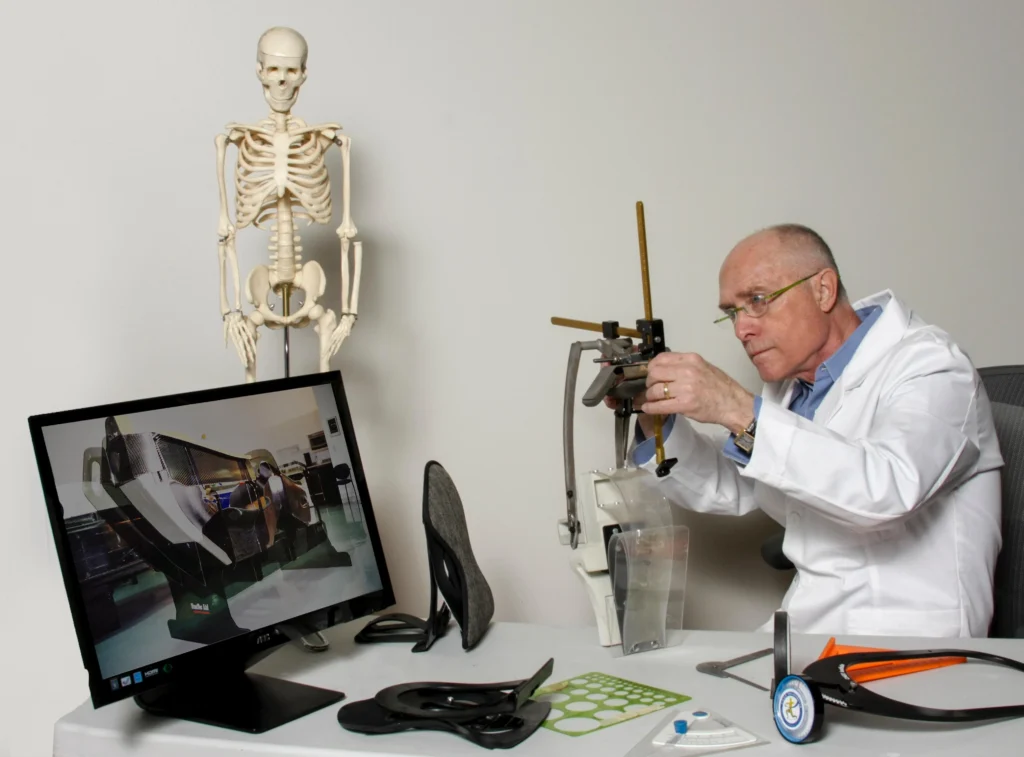Dr. Brock Walker is a leading authority in medically engineered technologies, making significant advancements across multiple industries. His career spans motorsports, aerospace, office furniture, and defense, with his contributions directly impacting safety, performance, and ergonomic standards. Educated at Johnson State College and Palmer College of Chiropractic, where he earned his Doctor of Chiropractic Medicine in 1977, Dr. Walker laid the foundation for his career by focusing on human biomechanics and performance. His early practice at Walker Clinic, P.C., in Lansing, Michigan, operated from 1977 to 1992, providing critical insights into spinal health and biomechanics that later shaped his engineering creations of Dr. Brock Walker’s.
In motorsports, Dr. Walker played a significant role in improving driver safety and performance. He designed nearly 100 custom seats for Indianapolis race car drivers, applying medically engineered principles to address the extreme demands of high-speed racing. His technology gained international recognition during the 1996 Indianapolis 500, where Buddy Lazier, despite suffering a broken back and shattered pelvis, won the race using a custom seat designed by Dr. Walker. This event underscored the life-saving potential of his designs. Dr. Walker collaborated with NASCAR teams, including Richard Petty and Jeff Gordon, Formula 1 and British Formula 3 teams, and enhanced cockpit seating technology. His work extended to developing advanced headrests, endurance-focused seating, and impact attenuation systems for high G-force environments.
Dr. Walker’s influence extended beyond motorsports into aerospace, where his expertise was sought by NASA for the International Space Station’s X-38 Crew Return Vehicle (CRV) program. He advised on astronaut protection and safety systems for the Orion Project, which defined acceptable levels of crew injury for lunar and Mars landings. Appointed by NASA’s Johnson Space Center to the Universities Space Research Association’s Division of Space Life Sciences, he contributed to advancements in space suit and seating technology. His research informed critical design parameters for crew exploration vehicles, ensuring safety during high-impact scenarios.
Dr. Walker collaborated with the Department of the Navy to combat pilot fatigue and improve crash impact attenuation. At the Naval Air Warfare Center, he contributed to safety and survivability programs to improve troop readiness and reduce injuries in aviation and occupational settings. His role included advising on a $5 million appropriation request to enhance deployed forces’ operational safety.
Dr. Walker’s entrepreneurial ventures further illustrate his ability to translate research into practical applications. As the founder and current President and Chief Technical Officer of TracTec Ltd., he oversees the invention, prototyping, and patenting of human interface technologies. He is named on more than 80 international patents, and his innovations have generated billions of dollars in commercial sales. TracTec Ltd. focuses on licensing medically-engineered products to manufacturers, leveraging a professional network of consultants in medicine, intellectual property, design, and material science. Similarly, Walker Medical Products, Inc. specializes in converting medical research into aftermarket seating products for diverse industries, reinforcing Dr. Walker’s influence on ergonomic design.
One of Dr. Walker’s most notable collaborations has been with Herman Miller Inc., where he has served as a Principal Partner and Science Advisor since 2000. His invention of PostureFit™ technology revolutionized office seating by addressing lumbar voids and promoting proper sacral-pelvic alignment. This innovation, with Zonal Support and Distribution Technologies, has been integrated into iconic Herman Miller products, including the Aeron, Mirra, Celle, Embody, Sayl, and Aeron Remastered chairs. These products have set global standards for ergonomic office furniture, emphasizing health and productivity.
His research and development efforts with Ford Motor Company further highlight his versatility. Dr. Walker advised on seating performance, safety, and comfort for consumer and law enforcement vehicles. His contributions included prototype development for federal, state, and local law enforcement agencies, showcasing his ability to adapt medical principles to automotive design. His medically-engineered seating technology underwent extensive user testing in 2004, demonstrating its effectiveness in reducing fatigue and enhancing comfort during prolonged use.
Dr. Walker’s extensive list of achievements is also reflected in his presence in numerous publications. His work has been featured in Autoweek, Car and Driver, and Popular Science, where his ergonomic innovations have been discussed in detail. Notable articles include “Seat Time” in Autoweek (June 1996) and “A Better-for-Back Aeron” in Popular Science (September 2002). Additionally, USA Today highlighted the role of his technology in Buddy Lazier’s Indy 500 win, further cementing his reputation in motorsports. His contributions have also been recognized in trade-specific journals like Ford Police Fleet Manager and Race Car Engineering, underscoring his influence across specialized fields.
Dr. Walker has demonstrated a longstanding dedication to advancing safety and performance in various industries. His extensive work in human interface technologies focuses on designing innovative solutions that enhance user experience and safety. Dr. Walker has established strong partnerships with prestigious organizations, including NASA, the United States Navy, Herman Miller, and leading automotive manufacturers.
Dr. Walker’s contributions span many fields, including motorsports, aerospace, and defense. He has developed medically engineered seating solutions, prioritizing comfort and functionality and addressing user challenges in demanding environments. His work has improved performance while significantly influencing the standards and practices within each industry, leaving a lasting legacy that continues to benefit professionals and consumers globally.







